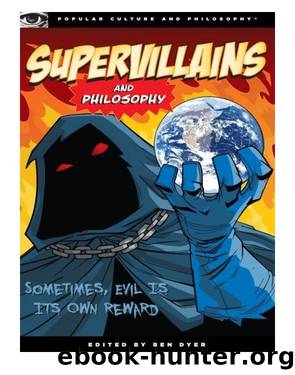Supervillains and Philosophy by Ben Dyer

Author:Ben Dyer
Language: eng
Format: epub
Publisher: Open Court
Published: 2011-09-07T16:00:00+00:00
Science is not inherently immoral; it’s simply not really concerned with morality. Whether science is used in a moral way or not depends on the people who exercise the knowledge it provides. Expecting science to provide only answers that are morally good, just because the question asked was well intended, is to make a potentially terrible mistake.
Whose Side Are You On?
In the final pages of Civil War, Tony Stark leads the mother of one of the Stamford Elementary victims through the S.H.I.E.L.D. helicarrier. He tells her about a list of one hundred things that he, Pym, and Richards have put together to improve the world. Number 42 on that list—the high-tech prison—has been met with public approval, and with the surrender of Captain America’s resistance the war over the registration act has finished. Stark ends the narrative with a smile and a vision: “The best is yet to come, sweetheart. That’s a promise.”25
This is an ending Hobbes would appreciate. Without the fear of superheroes toppling buildings or stepping on cars, people can get on with the important business of leading their lives. Stark is the new head of S.H.I.E.L.D., and promises to benevolently oversee the actions of his peers. The public has superheroes they can believe in again. Everyone is finally safe under the law.
What I’ve hopefully shown, however, is that making the tradeoff between safety and freedom in the way the Marvel characters choose to isn’t as simple as picking between two equally good options. Rather, it’s making the choice between two kinds of risk. We can accept the uncertainty that comes with living in a free world, and risk that the people around us may exercise their freedom in ways that put us in danger. Or we can choose to give up our freedom to be more secure, and risk that the individuals we trust with our safety will make poor decisions—even if they’re for the right reasons.
Stark’s closing promise of a better world isn’t meant insincerely, nor should it be seen as impossible. Political thinkers stretching back to Plato have imagined communities where order forms the basis for ideal society, but these societies are rarely “free” in the way we think of the word. It’s also worth remembering the costs of Stark’s “better world.” The Hobbesian project and its corresponding faith in the scientific direction of politics, which lies at the heart of the registration act and the approach adopted by Stark, Richards, and Pym leads heroes to accept the imprisonment of friends, the disintegration of personal relationships, and the death of a good man. Is this price too high? Is it better to be free, or is it better to be safe?
Whose side are you on?
Download
This site does not store any files on its server. We only index and link to content provided by other sites. Please contact the content providers to delete copyright contents if any and email us, we'll remove relevant links or contents immediately.
The remains of the day by Kazuo Ishiguro(7551)
Tools of Titans by Timothy Ferriss(6950)
The Black Swan by Nassim Nicholas Taleb(6192)
Inner Engineering: A Yogi's Guide to Joy by Sadhguru(5897)
Giovanni's Room by James Baldwin(5879)
The Way of Zen by Alan W. Watts(5800)
The Six Wives Of Henry VIII (WOMEN IN HISTORY) by Fraser Antonia(4791)
The Power of Now: A Guide to Spiritual Enlightenment by Eckhart Tolle(4756)
Astrophysics for People in a Hurry by Neil DeGrasse Tyson(4620)
Asking the Right Questions: A Guide to Critical Thinking by M. Neil Browne & Stuart M. Keeley(4576)
12 Rules for Life by Jordan B. Peterson(3734)
The Ethical Slut by Janet W. Hardy(3504)
Skin in the Game by Nassim Nicholas Taleb(3462)
Housekeeping by Marilynne Robinson(3402)
The Art of Happiness by The Dalai Lama(3385)
Double Down (Diary of a Wimpy Kid Book 11) by Jeff Kinney(3274)
Skin in the Game: Hidden Asymmetries in Daily Life by Nassim Nicholas Taleb(3264)
Walking by Henry David Thoreau(3234)
12 Rules for Life: An Antidote to Chaos by Jordan B. Peterson(3204)
